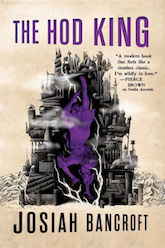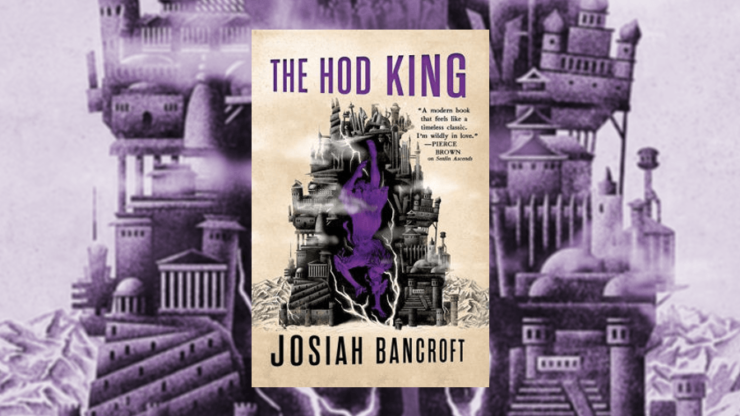The thrilling third volume of Josiah Bancroft’s The Books of Babel continues the incredible trajectory set by Senlin Ascends and sustained in its excellent successor. The first book in the series was tremendously inventive, and a bunch of fun, but for its iffy beginning; Arm of the Sphinx proved a superlative sequel in every sense, though it too suffered from a section that slowed progress; now, come The Hod King, there can be no denying Bancroft’s mastery of fantasy. It’s the biggest book in the saga so far, and the boldest, and, yes, the best.
So much has happened since Thomas Senlin was separated from his newlywed wife at the foot of the Tower of Babel, a superstructure so very vast that its inhabitants have their own laws and languages and the like. Maps and guidebooks are available, at a cost, but even if they were to be trusted—which, as Senlin has learned, they most assuredly are not—they hardly scratch the surface of the assorted wonders and terrors of the Tower. Truth be told, though, it was that very quality—the Tower’s unknowable nature—that brought Senlin to its gargantuan gates in the first place. As a schoolteacher from an isolated seaside village, he has an insatiable thirst for knowledge, but had he known that his honeymoon would leave him fighting to find his dear Marya, then by gum, he never would have come.
For days after their parting, Senlin searched desperately for her in the Market that surrounds the Tower, before buying his way through the Basement into the Parlor, and then, as the days became weeks and the weeks turned mercilessly into months, he arrived at last in the Baths. It was here that he found his first true clue: Marya had indeed passed through the Baths, in the company of a prestigious personage from Pelphia, a rich and powerful Ringdom still some levels up.
Sadly, Senlin was by this point penniless, and thus unable to gain access to Pelphia in the customary mode—that is to say, by bullying or bribing or blackmailing anyone in his way. And although he had made some friends as he ascended, inevitably, he’d made several enemies as well. To escape the men who wanted his head, he and his merry band stole an skyship known as the Stone Cloud, and became pirates, after a fashion, as they made their plans to penetrate Pelphia’s defences. Now, having secured the assistance of the Sphinx, the mysterious personage who built the many machines that keep the Tower from toppling, and command of her aircraft, the State of the Art, the time has finally come to put those plans into action.
The Hod King’s opening sees Senlin embedded in a hotel in Pelphia, with a new identity and a new purpose. The Sphinx has commanded him to keep a close eye on the Colosseum, where Hods—slaves, in so many words—fight for the entertainment of the Pelphian public. The Sphinx’s interest in this issue is in how it pertains to her ongoing conflict with the Hod King, a holy man by the name of Marat who Senlin can count among his many enemies, and who has been raising an army in order to achieve his own odd ends. Senlin has been told leave Marya well enough alone for the moment—that his friends will save her from the deplorable Duke who took her, should she even need saving—but of course he can’t resist trying to manufacture a meeting. That said, it’s been so long since he last saw her or spoke to her that he has his doubts she’ll give him the time of day:
For months, he had fought to be here, and now he wished to be anywhere else. Because the closer he came to the moment of their reunion, the more certain he felt that it would mark the end: the end of their marriage, the end of their shared history, and the end of a pursuit that had sustained him for many months, giving him purpose and strength.
Senlin isn’t so far of the mark, as a matter of fact. His meeting with Marya does indeed signal an ending, but unexpectedly, it is the end (if not The End) of our protagonist’s part at the heart of this narrative. You see, the boldest thing about The Hod King is the manner in which it essentially dispenses with Senlin to focus first and foremost on the secondary characters whose roles in the whole of The Books of Babel have grown with every volume. From the simply serviceable supporting souls of Senlin Ascends to the more needful independent people they proved in Arm of the Sphinx, Voleta, Iren and Edith Winters are altogether allotted three quarters of this necessarily long novel to rise to the challenge of temporarily supplanting the character these books have been about—and it’s a credit to the author that they do, without even appearing to.
Buy the Book


The Hod King
Odd couple Voleta and Iren’s high society hijinx are a real riot, and Edith’s oh so serious swashbuckling—aided and abetted as it is by Byron, the Sphinx’s stag-headed man—is as entertaining as it is exhilarating. Sure enough, all of the aforementioned derring-do is in service of Senlin’s quest, but each of the individuals involved is invested in it for his or her own reasons, and these reasons are given real weight and worth in the extended absence of Bancroft’s distractingly hapless protagonist.
Lest The Hod King’s setting go unmentioned, Pelphia itself, where almost all of the action and intrigue occurs, is perfectly suited to the story. As Voleta observes:
She had never seen anything quite so white or boisterous or beautiful as Pelphia before. All the shops, and there were so many of them, seemed locked in a battle for who could have the most overdone window display. There were wreaths of fresh flowers and live models posing as mannequins and trained doves clutching golden boughs and glass tanks full of live, darting fish, and all to sell a bobble or a boot or a square of caramel. No one seemed to find the excess the least bit strange.
A dollhouse on the grandest scale imaginable, Pelphia’s pretty, picturesque appearance brilliantly belies the ugliness underlying its artifice. It’s hard to imagine a better backdrop for a tale about rooting out the truth than a world so very vacuous that “even the brass sun in the sky seemed a toy, wound up and let go.”
From the humble beginnings of Senlin Ascends as a self-published work of fantasy that gradually gained traction to the startling success of the still more ambitious Arm of the Sphinx, The Books of Babel have been an encouraging thing to behold, and although The Hod King is not the end of the road—for “much as Senlin had underestimated his enemy, [his enemy] had underestimated him: his resourcefulness, his determination, and the strength of his friends” ensure the arrival of at least one more novel before the overarching story’s over—it evidences just how far Josiah Bancroft as an author, and likewise the literary landscape that eventually accepted him, has come.
The Hod King is available from Orbit.
Niall Alexander is an extra-curricular English teacher who reads and writes about all things weird and wonderful for The Speculative Scotsman, Strange Horizons, and Tor.com. He lives with about a bazillion books, his better half and a certain sleekit wee beastie in the central belt of bonnie Scotland.











Bancroft writes wonderfully. I look forward to the 4th (and final?) volume on this series, to rereading the series, and to what he writes next.
The book was good until it stopped in its tracks, re-wound to the beginning, and restarted from a different point of view. So I fast forwarded to the break-off point in the story and resumed reading. That worked out pretty well — I didn’t miss much that was important.
I couldn’t decide if Senlin was an undisciplined anemic bumbler who couldn’t fool a hamster, or a wise action hero who could bluff the world’s sharpest cult leader. It ought to be one or the other, right?
“I fast forwarded to the break-off point in the story and resumed reading. That worked out pretty well — I didn’t miss much that was important.”
If that’s your read on the long sections you skipped, this might not be the series for you.
I just finished The Hod King, and I’m utterly blown away. How is this series a secret? I for one am trying to tell the world that these are the best books I’ve read in years. Hail Josiah Bancroft!